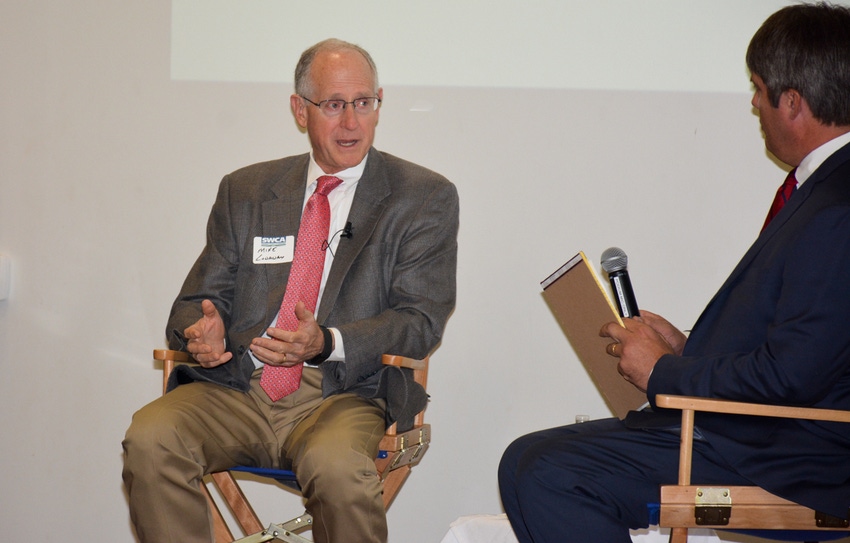
This article has been updated to: "MFP is based on 2018 production and will provide direct payments to eligible producers of soybeans, sorghum, corn, wheat, cotton, dairy, hogs, shelled almonds and fresh sweet cherries." We regret the error.
While the tariff war between the U.S. and China is proving to be painful for American growers, House Agriculture Committee Chairman Mike Conaway says there will never be a less difficult time to face a bully because the bigger a bully gets, the more difficult it is stand up.
“China is a bully and cheats,” says Conaway at the Southwest Council of Agribusiness annual meeting at Lubbock, Texas. “They cheat on their international agreements and they don't have the kind of fidelity to the rule of law you and I have and that's got to stop. Their economy will continue to get bigger, their influence in the world will become more profound, and we have to stand up.
“And the bigger they get, the more difficult it will be to force them to the table.”
But confronting a global bully has resulted in retaliatory trade tariffs which in turn is hurting agriculture. “Our president understands China wants to use production agriculture as leverage to get something done on the trade deal. That’s why he announced the Market Facilitation Program (MFP), to not allow China to use our producers as a weapon against ourselves.”
MFP is based on 2018 production and will provide direct payments to eligible producers of soybeans, sorghum, corn, wheat, cotton, dairy, hogs, shelled almonds and fresh sweet cherries.
“That’s about $4.7 billion in help,” Conaway says, of the $12 billion in aid authorized.
Along with MFP, two other aid programs are available:
Agricultural Trade Promotion Program (ATP), a program designed to help American farmers find and access new markets for their products.
Agricultural Marketing Service (AMS), assistance created to purchase up to $1.2 billion in commodities and distribute them through nutrition assistance programs.
Conaway describes trade negotiations as President Trump’s “wheelhouse.” “I don't think there's anybody negotiating better on behalf of America than Donald Trump.
“The president is using tariffs and is using them very effectively to force other nations to come to the table to negotiate and renegotiate trade deals,” says Conaway, referring to deals made with Europe, Mexico and now Canada.
But while Conaway believes the president will get the trade deals done and Americans will eventually look in their rearview mirror and “feel a whole lot better” about the trade situation, he is aware of the difficulties staring farm and ranch families in the face today.
“Bankruptcies are up 39 percent. It’s hard, hard times right now,” says Conaway. “They're living these low commodity prices of turmoil, losing markets they’ve spent years trying to develop. All of these things are going on with them and they're trying to cope with it.”
And while the U.S. economy is “booming,” Conaway points out, rural America is not. “Why agriculture has to be so counter-cyclical to everything that is going on is amazing. Farmers are not enjoying the 4 percent unemployment and the 44 percent growth in this economy. All those things are going forward, just not happening in rural America.”
To help relieve some of the financial burden, Conaway and his Senate colleagues working on the farm bill, agree more money needs to be spent on the Market Access Program and the Foreign Market Development program. MFP also directs money into those programs, he adds.
“I wish I had better answers for you, but I don’t. Our president is negotiating, and if you want somebody negotiating on your behalf, I think you want President Trump.”
About the Author(s)
You May Also Like






